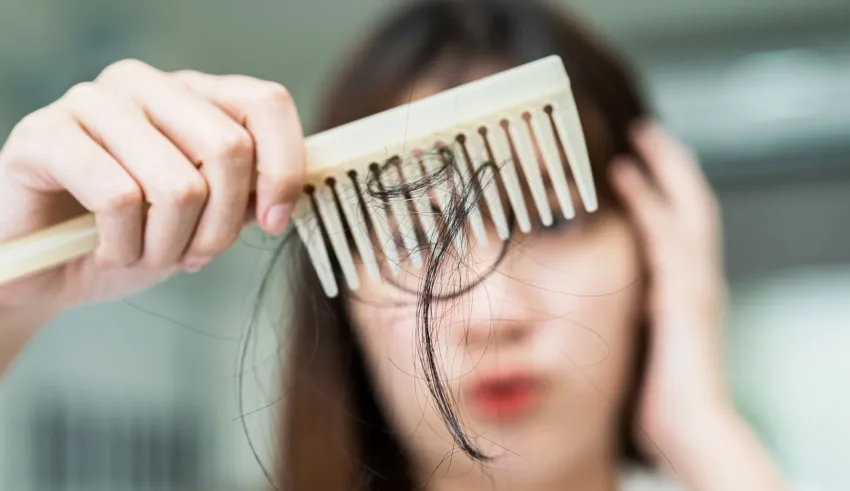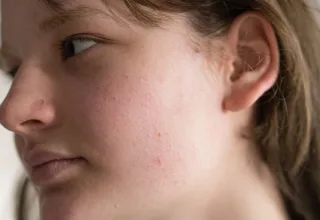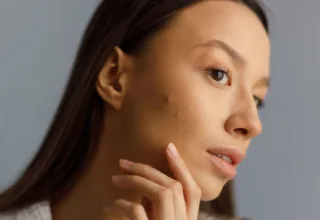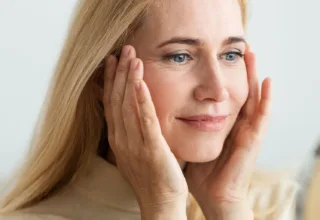
Stress is a silent killer, they say. But what they don’t tell you is that it’s also a hair killer. That’s right, stress doesn’t just make you feel like you’re about to pull your hair out – it can actually make your hair fall out, too! So if you’re starting to look like you’re auditioning for the role of Dr. Evil, you might want to take a closer look at your stress levels. But don’t worry, we’re here to help you laugh (and hopefully not cry) through this hairy situation. So sit back, relax, and let’s dive into the wild world of stress-related hair loss in this article in collaboration with the dermatologist Dr. Nancy Labib.
What are the types of stress-related hair loss?
There are generally three types of stress-related hair loss:
- Telogen effluvium: This is the most common type of stress-related hair loss. It occurs when your body experiences a shock or stressful event that causes hair follicles to enter the telogen (resting) phase prematurely, resulting in excessive shedding.
- Alopecia areata: This is an autoimmune disorder that can be triggered by stress. It causes your body’s immune system to attack hair follicles, leading to patchy hair loss.
- Trichotillomania: This is a compulsive hair-pulling disorder that can be triggered or exacerbated by stress. It can cause hair loss and damage to the scalp.
According to Dr. Nancy Labib, stress-related hair loss usually begins 2 to 3 months after a stressful event and can last up to 6 months. With ongoing stress, hair loss can continue for years. She adds that all types of stress, such as physical stress, psychological stress, psychosocial stress, and psychospiritual stress, cause hair loss.
What are the other causes of hair loss?
While stress can be one of the causes of hair loss, it’s not the only reason some of us lose those beautiful strands. There is a long list of conditions that can cause hair loss, including:
- Androgenetic alopecia: This is a genetic condition that causes hair loss in both men and women. It is also known as male or female pattern baldness.
- Medical conditions: Hair loss can be a symptom of several medical conditions, such as thyroid disorders, alopecia areata, lupus, and others.
- Medications: Certain medications can cause hair loss as a side effect, such as chemotherapy drugs, blood thinners, and some antidepressants.
- Nutritional deficiencies: A lack of essential nutrients, such as iron, protein, or vitamin D, can lead to hair loss.
- Hairstyling practices: Certain hairstyles and hair treatments, such as tight braids, weaves, and chemical treatments, can damage your hair and cause it to fall out.
- Aging: As you age, your hair may naturally become thinner and less voluminous.
Dr. Nancy Labib adds that a lack of sleep can also create stress in your body, which increases the risk of telogen effluvium. In addition, lack of sleep causes generalized exhaustion and affects the absorption of certain vitamins, which has a direct negative impact on your hair follicles and leads to hair loss.
It’s important to see your doctor or dermatologist to determine the underlying cause of hair loss and develop an appropriate treatment plan.
How do you know if hair loss is due to stress?
According to Dr. Nancy Labib, there are three ways to tell if hair loss is caused by stress:
- Hair loss usually occurs shortly after experiencing some stress.
- Absence of other causes of hair loss.
- More than 100 strands of hair blocking the shower flow is a sign of hair loss. In the case of stress-related hair loss, you will notice thinning hair on the scalp. In the case of alopecia, you may see bald patches on the scalp.
What are some ways to combat stress-related hair loss?
The good news about stress-related hair loss is that it is often reversible. Stress and hair loss do not have to be permanent. If you keep your stress under control, your hair can grow back.
If you are experiencing stress-related hair loss, try the following strategies to speed up regrowth and cover up thinning areas:
- Eat right
A well-balanced diet rich in vitamins and minerals can contribute to healthy hair growth. Foods rich in biotin and protein, such as eggs and milk, can promote healthy hair and nail growth.
- Use hair supplements
Taking supplements that contain vitamins and minerals that promote healthy hair growth, such as biotin and zinc, can also be helpful.
Look into the following food supplement that provides the hair bulb with essential nutrients (such as vitamins B6, B8, E, and iron). This strengthens the hair and promotes quality growth.
Ducray Anacaps Food Supplements
- Get plenty of sleep
Stress and anxiety can greatly disrupt sleep, causing insomnia and other sleep disorders that can further alter the body’s hormonal balance. Try to get 7 to 9 hours of sleep a night and follow good sleep hygiene practices, such as going to bed and getting up at the same time each day, sleeping in a cool, dark room, and keeping electronics out of the bedroom.
- Exercise
Regular exercise can help relieve stress and help you better cope with stressful situations and challenges. Establish a consistent routine and make sure to include cardiovascular and strength training exercises for the best results.
- Adopt relaxation techniques
Practicing yoga, meditation, or mindfulness can help restore calm and soothe a stressed mind. Even a few minutes of meditation a day is very helpful in reducing stress and can help you break the cycle of stress that causes hair loss. Make time for hobbies and other activities that you enjoy and that can help you decompress from life’s stressors.
- Be gentle
Tugging on hair or wearing it in a ponytail or tight bun daily can cause breakage and hair loss. Be careful when detangling wet hair, such as after a shower or swim. Wet hair is more prone to breakage than dry hair. If your hair is very tangled, start at the bottom – gently loosen the ends and work your way up, detangling a little at a time.
- Avoid harsh hair treatments
Avoiding hair treatments that can damage hair, such as chemical treatments and hot styling, can help prevent hair loss.
- Use a hair loss shampoo
Hair loss shampoos can play an important role in maintaining scalp health, which is important for healthy hair growth. While shampoos alone cannot cure hair loss, they can help treat some of the underlying causes of hair loss, such as an unhealthy scalp or excessive oil and hair product build-up.
Some hair loss shampoos contain ingredients that can help promote hair growth, such as biotin, niacin, or caffeine. Others may contain ingredients that help remove buildup and unclog hair follicles, such as salicylic acid or ketoconazole.
It is important to note that not all hair loss shampoos are created equal and some may not be effective for all types of hair loss. It is best to consult a physician or dermatologist to determine the underlying cause of hair loss and recommend a suitable shampoo or hair care regimen.
Overall, hair loss shampoos can be a useful tool for promoting scalp health and maintaining healthy hair growth, but they should be used in conjunction with other hair loss treatments and a healthy lifestyle.
Here is our pick for the best anti-hair loss shampoo.
Ducray Anaphase + Anti-Hair Loss Complement Shampoo
- Be patient
For many people, the problem resolves itself. Being patient and trying to relax is often the best way to speed up this process. Unfortunately, there is no quick fix. But time can be a great healer for many things.
- Use hair loss lotion
Hair loss lotions can be beneficial for stress-related hair loss, as they can help promote hair growth and improve scalp health. Hair loss lotions are usually applied directly to the scalp.
Ducray Creastim Anti-Hair Loss Lotion
This hair loss treatment lotion provides an appropriate response to occasional hair loss. It facilitates hair growth by improving the proliferation process of the hair bulb cells.
Conquering stress-related hair Loss
Remember, stress can be a hairy situation – quite literally! If you’re experiencing stress-related hair loss, don’t pull your hair out just yet. Take a deep breath, relax, and remember that there are plenty of solutions out there to help you manage stress and promote healthy hair growth. With the right treatment plan and a little bit of patience, you’ll be able to say goodbye to stress-related hair loss and hello to a luscious head of hair!
Don’t let stress get the best of your locks – take action today and let your healthy, beautiful hair shine!
Last Updated on April 16, 2024












